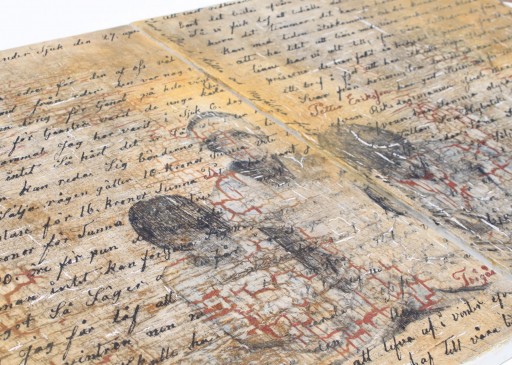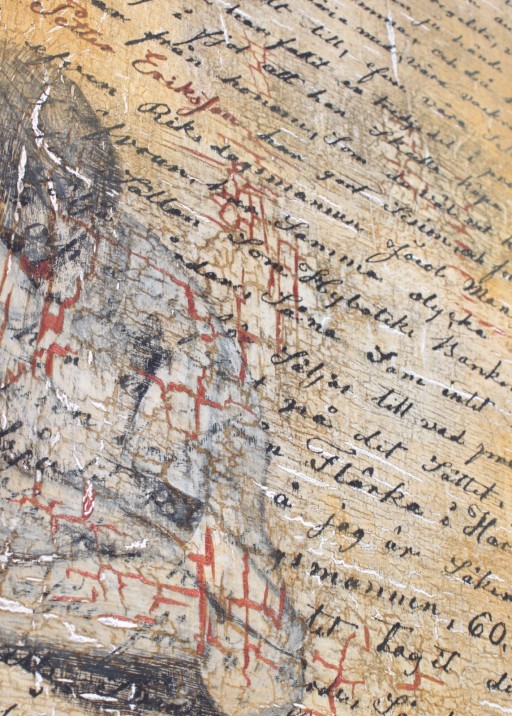I love old handwriting. It makes me sad that the art of it is disappearing. I was looking through some of my paintings in storage and came across this one. I should have included it with my postage stamp/cigar label art tutorial. I made the canvases for the base of this diptych by enlarging a letter written by my great-great-great-grandfather. I used Modge Podge to seal the paper to the canvas. I painted some images on top of the letter, but you could easily enlarge any portion of an old family letter by itself for art. The penmanship would speak for itself!
The images I painted on the canvases were from an “orphan” photograph I picked up somewhere. It was a photo of 2 children and a woman sitting outside on a blanket. The woman had a pretty white flower band on her head. The name “Nanny” was handwritten on the back of the photo.
My great-great-great-grandfather Sven Nilsson wrote the 1886 letter to his son (my great-great-grandfather) who had immigrated to America (Kansas). My grandfather’s brother found this letter and a bunch of others years ago hidden in a farmhouse wall. Below is the translation… you might find it interesting. It makes me very thankful that I have food on the table…..
Jonsho under Tjuk – 27 April 1886
Dear children:
We first want to thank you for the unexpected gift we received from you. It was certainly welcome. Would you believe, I have not earned anything all winter. Here there has been not work for the young men and certainly not for those who are older. I have been in “Tjuk” six days this winter. It is hard to explain how difficult it is. These are terrible times for us. It is so bad that one can hardly manage. Farmers get nothing for what they have to sell. Rye brings 10 crowns a barrel. Wheat, I think, sold last fall for 16 crowns a barrel. Potatoes have held at 2 crowns a barrel all winter. White flour costs 1.50 per pound, rye flour 90 “ore”(cents) per pound. Times are not expensive but what help is that when one cannot earn some money? If someone lets one work, they tell you that you will not receive money but you’ll receive flour or potatoes. I must say that we have managed quite well over winter but now our supplies are about gone. I should have received double compensation from the farmer at “Skrãllbo” and last summer we managed to put away a half barrel which August at “Trãgárdstuge” borrowed from us, so that have we had to live off of this winter. Also we got a [small crop of] potato this summer. So our needs have been met.
And now as The Word says “When the need is greatest, help is near at hand.” So we praise God that we need not be destitute. God bless you who have helped us, and also thanks for the goodness you have shown us.
We also thank you for the chifferobe and beds you made when you were home. All of our necessary things we still have. I do not wish to lose the best of our things. Our auction went so poorly that we kept most of our belongings. Of course, it could happen that some of you may in time return and then it might be helpful to have something to begin with. Our lovely bed comforters and linens we have kept, also our silver spoons. You asked about the worth of our farm. Prices have fallen by one-third. I wrote to Johan last year that he should buy “Slycke” but I received no rely from him. As you likely know can happen, Jacob Peter Eriksson has declared bankruptcy and has sold all of his farms. Even director Jacob Magnus Swensson in “Stora Grãfvran” has had the same misfortune and it is not so seldom that Hyboteks Banken (a bank) at Linkõping must sell farms for such as have not aid their interest and these are sold for whatever price can be gotten. “Axhult” was sold in this manner. “Grãfverumons-gãrderna” (certain farms) have a person from “Flãrka at Harn Socken” (community) purchased for 19,000 crowns, and I am certain that if anyone had offered the director over 60,000 over two years ago, he would not have accepted it. The auctioneer had to sell for one-fourth of its worth—so what one has is worth nothing. You likely know that Sven at “Hofle Stugan” is dead. They wondered if I should write you but it was agreed that Sylvia should write. Mother Annalana has moved to Hulda and there she is contented.I must close this long letter for this time with our dearest greetings to all of you.
Swen Nilsson


